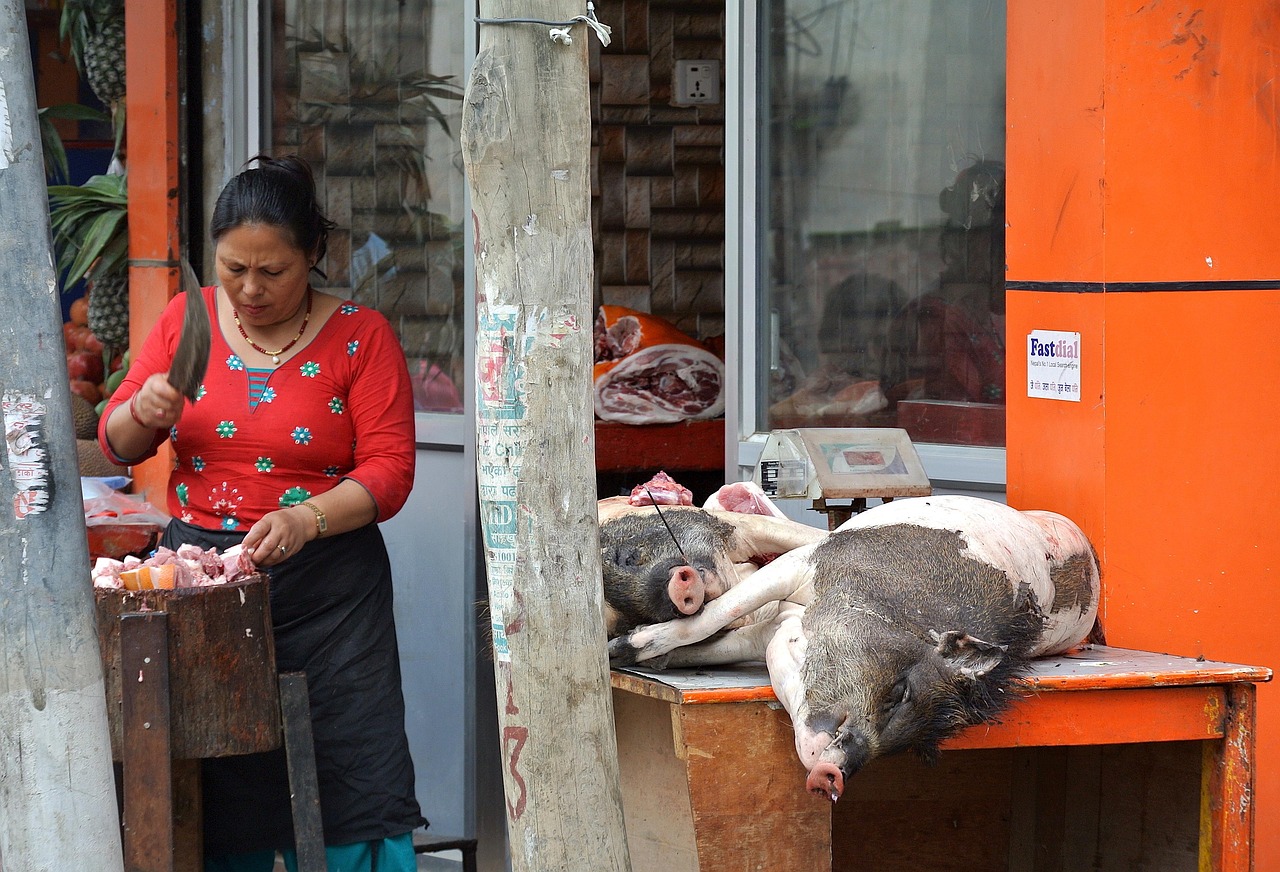During my childhood in rural India, we raised backyard chickens and pigs that were usually slaughtered on occasions of Catholic feasts, and in the late summer prior to the lean monsoon season. These occasions of animal slaughter were difficult for me. The distressed cries of the animals and the sight of splattered blood unsettled me. So, I learned to be out of the house when I knew of an impending animal slaughter.
Animal slaughter is a controversial topic. Most people, even those who eat meat every day, have never slaughtered an animal. Some claim that they would have no qualms slaughtering the animals that they eat. They may be sincere, but most do not follow up on their claims. Most people do not even wish to watch videos of slaughterhouses. We innately know that something is distressing about taking away the life of a sentient creature. It is no surprise then that those engaged in slaughtering animals suffer from psychological injuries.
Slaughterhouse workers have the gruesome job of slaughtering, gutting, and slicing up animals. In a story on the BBC, a former worker talked about learning to become numb to the suffering and death of animals. Instead of thinking about cows as entire beings, she forced herself to see cows as edible body parts. But it wasn’t a foolproof strategy. Some things had the power to shatter her willful numbness. It is worth quoting her experiences in detail:
“At the end of the slaughter line, there was a huge skip (open container), and it was filled with hundreds of cows’ heads. Each one of them had been flayed, with all of the saleable flesh removed. But one thing was still attached – their eyeballs. Whenever I walked past that skip, I couldn’t help but feel like I had hundreds of pairs of eyes watching me. Some of them were accusing, knowing that I’d participated in their deaths. Others seemed to be pleading, as if there were some way I could go back in time and save them. It was disgusting, terrifying, and heartbreaking, all at the same time. It made me feel guilty.”
The horrors did not leave her at the end of the day. When she finished her shift, an “increasingly heavy and grey fog” descended over her, bringing nightmares at night. The horrors of the day replayed in her mind, over and over and over—the psychological injury accumulated with time. She suffered from depression that was exacerbated by the long hours, the relentless work, and being surrounded by death. After a while, she started feeling suicidal. Even years after she left the job and sought help, she was still haunted by the hundreds of pairs of eyeballs staring back at her.
Slaughterhouse work has been linked to what is now termed “Perpetrator-Induced Traumatic Syndrome” (PITS) to refer to symptoms of PTSD that afflict those causing trauma to others. Because humans have an inclination towards kindness, slaughterhouse workers need to act against this core human tendency. Psychologists term this inner conflict arising when there is a discrepancy between one’s actual behavior and the morally ideal behavior as moral dissonance. When this conflict becomes chronic and unresolved, the cumulative toll results in moral injury, which is “the lasting emotional, psychological, and social harm that arises from repeated violations of one’s moral code.” Their observation of PITS symptoms corroborates the slaughterhouse worker’s narrative. They have documented trauma symptoms such as anxiety, nightmares, emotional shock, guilt, and substance use among current and former workers.
Not surprisingly, the trauma is worse if the farmers and workers have a relationship with the animals before they are slaughtered. Research shows that farmers who interacted daily or almost daily with their animals were more likely to feel extremely morally concerned about their work than farmers who interacted with their animals only rarely.
A farmer recalled that he felt terrible whenever he had to slaughter and eat his own animals. “When I have had to kill, gut, and prepare, I struggle to eat it, which is why I am getting someone else to take the sheep to slaughter.” Even that strategy does not always work. Another farmer narrated that sending his animals to slaughter was the hardest thing he had had to do, and he felt terribly guilty, and he hated himself for doing that to the animals.
These findings cast doubt on the view that meat from small farms is ethically more acceptable. Small farmers have to deal with the trauma of their beloved animals being slaughtered. Even if these farmers do not kill their animals, the act of sending the animals to slaughter is a traumatic experience for the one who has nurtured and cared for the animals. It evokes a sense of betrayal of trust. These animals had seen you as a caregiver and a friend. And then you send them to their deaths.
Perhaps, we may wonder why these animal farmers continue in such a traumatic profession. Researchers have found that financial pressures, regulatory obligations, and entrenched cultural ideals coerce them despite their moral and psychological concerns. Data from a survey indicated that 63% of farmers would consider reducing their livestock numbers if provided with viable financial alternatives, and 49% expressed a willingness to leave livestock farming entirely if they had access to equal or higher income options. Similarly, many slaughterhouse workers are undocumented immigrants who have few other options for work. In other words, most people would not work in such an industry if they had a choice.
Quoting the Catechism, Pope Francis wrote in Laudato Si , “It follows that our indifference or cruelty towards fellow creatures of this world sooner or later affects the treatment we mete out to other human beings. We have only one heart, and the same wretchedness which leads us to mistreat an animal will not be long in showing itself in our relationships with other people. Every act of cruelty towards any creature is contrary to human dignity.” [92]
The Church exhorts us to treat animals kindly, if not for the sake of the animals, at least for the sake of our own moral and mental well-being. For Thomas Aquinas, cruelty against animals is wrong because it corrupts the virtue and character of the abuser:“Now it is evident that if a man practices a pitiful affection for animals, he is all the more disposed to take pity on his fellow men. Consequently, the Lord, to inculcate pity to the Jewish people … wished them to practice pity even concerning dumb animals.” We ought to be kind to animals because, if nothing else, it will make us kind people. Kindness and mercy are hallmarks of humans being made in the image of God.
The traumatic experiences of the animals and workers haunt the meat on our plates. In his book Dominion, Matthew Scully tells meat consumers that the only thing worse than cruelty is delegated cruelty. Because we are unwilling to do the dirty work ourselves, we have delegated it to poor souls who knowingly or unknowingly, willingly or unwillingly, do grave moral and psychological harm to themselves. Every time we purchase and consume meat, we induce demand for more meat in the market, thus perpetuating the violence and horror on animal farms and in slaughterhouses. As Ralph Waldo Emerson sagely noted, “You have just dined, and however scrupulously the slaughterhouse is concealed in the graceful distance of miles, there is complicity.”
In the month of November, the Pope asks the faithful to pray for the prevention of suicide. We can pray for animal farm workers, one group among unfortunately too many who struggle with mental health, that they “find the support, care, and love they need in their community, and be open to the beauty of life.”
Let us pray that we too will become open to the beauty, goodness, and sanctity of life, of humans and animals. We can pray for the grace to abstain from complicity in an industry that causes immense violence and trauma to humans and animals. By the grace of God, most of us do not need to consume meat. We are biologically capable of living a healthy life on a plant-based diet, and we live in a world where plant-based food is affordable and readily available.
Twenty-first-century America is probably the best place for a plant-based diet in the history of humanity. That makes all the psychological and moral injury inflicted on slaughterhouse workers by the meat industry, and by extension meat consumers, all the more tragic. Knowledge of this evil ought to motivate Christians to shun products derived through violence and cruelty, if not for the sake of the animals themselves, then at least out of concerns for fellow humans. After all, the unnamed and unseen slaughterhouse worker is also our neighbor whom we are called to love.


